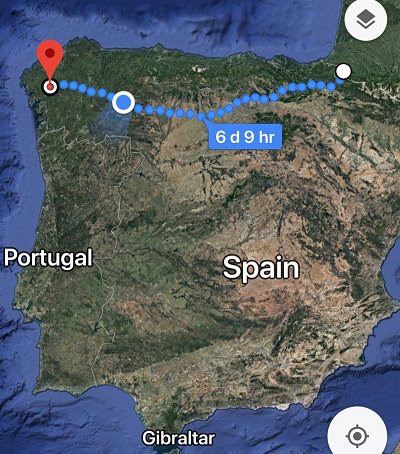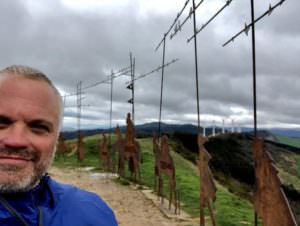Managing Editor's note: Rob Prugue is a leading figure in Australian funds management. He was most recently Senior Managing Director and CEO of Lazard Asset Management (Asia Pacific), responsible for the business across Asia. Rob is one of those executives and fund managers who always takes a broad view of the world. Conversations are not only about markets and economics but philosophy and social obligations, and he was actively involved in charity fund-raising. He retired after 15 years at Lazard to give himself a long sabbatical before considering his next role.
Part of this break from work includes an 800-kilometre walk along El Camino. The Camino de Santiago pilgrimage ends in the Spanish province of Galicia, believed to be the resting place of St James the Apostle. This has been a spiritual trail for pilgrims since medieval times and it has no real starting point. Rob thinks of his trip in thirds:
“The first third is one of physical exhaustion, or getting our bodies into its rhythm. The second third is about ‘letting go’, while the final third is about understanding what El Camino has taught us. I like this, not because I look forward to the final third, but because I too am learning to let go of certain things.”
This journey of self-discovery took a remarkable twist, as Rob describes in this extract from his blog (which can be followed here):
“As I entered this little stone chapel, I noticed it wasn’t a church after all, but a shrine. I asked the gardener to whom it was for, and he answered it was for Archangel Michael. Perfect, I thought. A place to pray for family and friends fighting for health.
A few hours later, I received a message from my brother-in-law in Lima, Peru. He said a few hours earlier, my 92-year-old mother’s heart just stopped. My beautiful mother, Norah Salkeld de Prugue, passed away on the morning of 24 April 2018 in Peru.
I now realise that my being compelled to enter the little stone chapel was no coincidence. My mother’s soul was speaking to me, asking me to come in to say goodbye. While my prayers were for family and friends, I interestingly enough did say an extra-long one for my lovely mother.
I still cannot believe this. As I later entered into Carrion, my final destination today, I immediately went to the lovely church, said a prayer, and lit a candle. A sister saw me weeping and asked if she could help. I told her the story and she said she would speak to the local priest. The nun made sure the evening service was in my mother’s honour. The priest and the town congregation were so very kind in giving that service in her name. The town people all came around to wish their sympathies. Truly generous hearts here in rural Spain.
Before you roll your eyes, I appreciate this is likely a coincidence. But perhaps, just perhaps, it’s my mother suggesting I continue and finish this 500-mile walk.”
Then a few days later, this update:
“Clearly the Camino must think I’m one bad ass as only hours after my pulling myself up from my mother’s funeral half a world away, I learned that my sister-in-law, Paloma, had just passed away following her 13-year battle with breast cancer.”
It's turning into quite a journey.
Earlier, Rob had sent me this email:
“Oddly enough, as well as reflecting on life, my reflections have been on superannuation. A recent article in The AFR about industry funds got me going. Here’s my thoughts from El Camino.”
 As at 4 May, Rob had walked 590 kms, with another 210 to go. He's due to reach his destination by 11 May.
As at 4 May, Rob had walked 590 kms, with another 210 to go. He's due to reach his destination by 11 May.
Superannuation: it should not be 'us versus them'

Coming to my second month of my three-month sabbatical, and now 200 kilometres into my 800-kilometre Way of St James (the Camino) here in Spain, I was hoping to find some sort of spiritual self-fulfilment through my daily routine of 30,000 steps. And while on this self-introspection, it took an opinion piece in The Australian Financial Review on 11 April 2018 titled Why Industry Funds Are Not So Super to remind me just how much superannuation is a part of me.
As Al Pacino said in Godfather 3, just when I thought I was out, they pull me back in!
Peer rankings useless for superannuation
What bothered me most was less the continued division between industry and for-profit super providers, but the continued focus on peer rankings. In all my years of learning and working within superannuation, I have yet to find ANY academic book which suggests that the best way to immunise a pension liability (i.e. matching future assets to future pension liabilities) is by choosing a top quartile performer.
And while of course it’s true that returns do matter (to be precise, net of fees and net of taxes), pension liabilities are acyclical whilst asset returns are cyclical and subject to market forces. Peer performance rankings, therefore, are futile within superannuation.
Funds in net outflow compounds problem
This bee in my bonnet is equally founded on demographics, as an increasing number of both retail and industry funds are experiencing net outflows given baby boomers have already begun to retire. Once retired, pension immunisation is all the more important. The ability to forecast steady cash outflows off an increasingly cyclical economic environment is paramount in planning retirement years. Yet, the media and agents remain consumed on metrics that play no part in pension management. Perhaps this is due to the fact how within the financial services industry, wealth management is itself a big component therein.
Whatever the reason, superannuation is not wealth management, it’s about optimising assets around returns required to immunise pension liabilities. Pure wealth management, on the other hand, cares little about asset/liability immunisation.
Let’s move beyond political name-calling
My secondary beef is the obvious political affiliation intended behind their defining what is an ‘industry fund’ and what is a ‘for-profit fund’. Calling an industry fund a ‘union fund’ is naive. I neither belong to a union nor do I belong to a party, yet I have my super within a so called ‘union fund’. Having attended conferences run by both sides, I’ve always rolled my eyes when discourse turned to political affiliations. Who cares? If super fails, it will affect ALL tax payers as neither party will allow its retired voters to live in the streets. How we tax any fund may be politically aligned, but their policy for superannuation should be nonetheless apolitical.
I pose this piece not to continue to divide, but to hopefully remind us to challenge anyone who feels it necessary to divide superannuation funding into an ‘us versus them’ debate. What defines our industry isn’t ‘for profits vs not for profits’, but superannuation itself. Sadly, both sides are guilty of this division, and equally, both sides will need to come together if we are going to achieve our true purpose.
Rob Prugue was Senior Managing Director and CEO at Lazard Asset Management (Asia Pacific) for 15 years until March 2018. These opinions are his own.